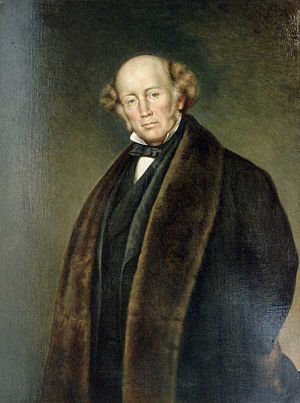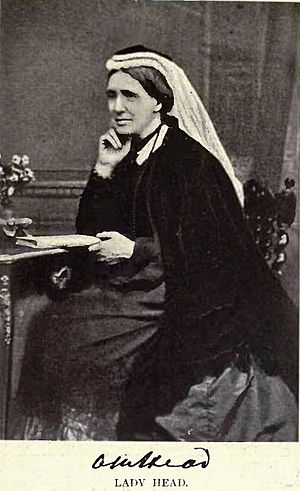Edmund Walker Head facts for kids
Quick facts for kids
Sir Edmund Walker Head
|
|
|---|---|

George Theodore Berthon's Sir Edmund Walker Head, 8th Baronet
|
|
| Lieutenant Governor of New Brunswick | |
| In office 1848–1854 |
|
| Monarch | Victoria |
| Preceded by | William MacBean George Colebrooke |
| Succeeded by | John Manners-Sutton, 3rd Viscount Canterbury |
| Governor General of the Province of Canada | |
| In office 1854–1861 |
|
| Monarch | Victoria |
| Preceded by | James Bruce, 8th Earl of Elgin |
| Succeeded by | Charles Monck, 4th Viscount Monck |
| Personal details | |
| Born | 16 February 1805 Wiarton Place, near Maidstone, England |
| Died | 28 January 1868 (aged 62) London, England |
| Spouse | Lady Anna Maria Head (née Yorke) |
Sir Edmund Walker Head (born February 16, 1805 – died January 28, 1868) was an important British politician and diplomat in the 1800s. He held high positions in what is now Canada. He was known for his work in education and government.
Early Life and Learning
Edmund Head was born in England, near Maidstone, Kent. His father was Sir John Head. Edmund took over his father's title in 1838.
He went to Winchester College and Oriel College, Oxford, which are famous schools. In 1830, he became a Fellow at Merton College. This meant he was a respected scholar and teacher. He wrote several books, including one about the English words shall and will.
He also translated an old Icelandic story called The Story of Viga Glum. This showed his interest in different languages and cultures. In 1863, he was chosen as a Fellow of the Royal Society. This is a special group for top scientists and thinkers.
Serving the Government
In 1847, Sir Edmund Head became the Lieutenant Governor of New Brunswick. This role meant he was the Queen's representative in the colony. He served in this position until 1854.
During his time as Lieutenant Governor, he did something very important for education. He approved the creation of an engineering program at the University of New Brunswick (UNB). This was the first program of its kind in what would later become Canada.
In 1854, Head was given an even bigger role. He became the Governor General of the Province of Canada. This was the highest position for a British official in Canada at the time. He served until 1861. During his time, there was a tricky political situation called the "Double Shuffle." This was a time of debate about how the government should be formed.
He received special honors for his service. In 1857, he became a Privy Councillor. In 1860, he was made a Knight Commander of the Order of the Bath. This is a very high honor.
Sir Edmund Head passed away in London, England, in 1868.
His Family
Sir Edmund married Anna Maria Yorke in 1838. She was born in 1808. They had three children together. Sadly, their son drowned by accident in Quebec in 1859. One of their two daughters was born in Fredericton, New Brunswick, in 1849.
Lady Anna Maria Head was also a talented person. She was an artist and drew a picture of the view from Major's Hill Park in Ottawa. She gave this drawing to Queen Victoria. Soon after, Queen Victoria chose Ottawa to be the capital city of Canada.
Lady Head also helped people in need. She gave money and support to the poor. A special monument stands in Portage-du-Fort, Quebec to remember her trip up the Ottawa River in a bark canoe in 1856. A township in Ontario, called Head, Clara and Maria, was named in her honor. Lady Head died in England in 1890.
What He Left Behind
Sir Edmund Head is remembered in several ways:
- The engineering building at the University of New Brunswick is named Sir Edmund Head Hall.
- The town of Edmundston, New Brunswick, is named after him.
- A township in Ontario, Head, Clara and Maria, is named after both him and his wife.
- Mount Head in the Canadian Rockies is also named after him.
See also
- List of lieutenant governors of New Brunswick
- List of governors general of the Province of Canada


